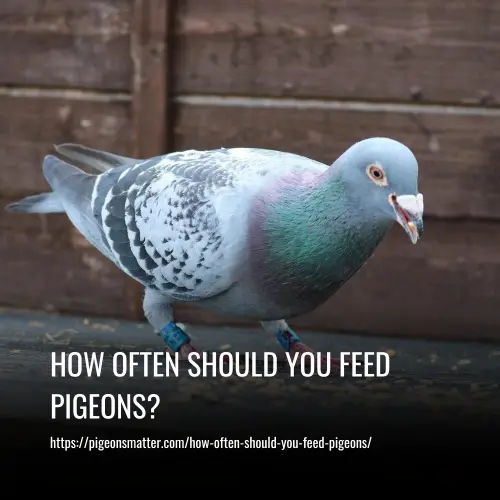How Often Should You Feed Pigeons?
This post contains affiliate links. As an Amazon Associate, we earn from qualifying purchases.
High-flying pigeons and regular pigeons have different feeding schedules. High-flying pigeons should be fed once a day to prevent them from gaining weight, which could affect their flying abilities and performance in competitions. These pigeons are kept separate from regular pigeons to avoid overfeeding.
On the other hand, regular pigeons, which don’t fly much or have other responsibilities like caring for baby pigeons, should be fed twice a day. Mixing these two types of pigeons in the same cage is not recommended. It is a common practice worldwide to follow these feeding schedules for captive pigeons.

Can Pigeons Go A Day Without Eating
Pigeons are scavenger birds and can survive for a couple of weeks without food if necessary. Their natural scavenging instincts help them find food, but if they can’t, they can go without eating for a period of time.
However, they can’t live without food, and it is crucial for their health and well-being. In the wild, they may have a hard time finding food, but they are resilient and can manage for a period without it.
Do Pigeons Stop Eating When Full
Pigeons are known for their hearty appetites and their fast eating habits. They will continue eating until all the food is gone, meaning that feeding them can become quite costly. Additionally, pigeons are not known for sharing their food with other birds.
This behavior can lead to an increase in food consumption and expenses, making it important to consider the potential costs of attracting pigeons to your feeding area.
Are Pigeons Always Hungry
Pigeons, like all birds, have a high metabolism, leading them to need to eat frequently. However, this does not mean that they are always hungry. When satiated, pigeons will seek out safe locations to rest and roost, which often means that they are out of sight.
Therefore, the absence of visible pigeons does not necessarily indicate hunger; rather, it may simply mean they are taking a break from feeding.
How Much Should A Pigeon Eat A Day
Each pigeon should start with 2 tablespoons of food, then adjust the amount based on their consumption to ensure that the morning feeding is completely consumed by evening. This amount may need to be adjusted based on individual bird’s eating habits and activity levels.
What Is The Best Way To Feed Pigeons
Hand raised babies are the easiest to start on a pelleted diet. Pellets should ideally represent approximately 50% of a pigeon’s diet along with small amounts of seed and fresh produce. Finely chopped vegetables and greens, plus smaller amounts of fruit, should be offered as part of a pigeon’s or dove’s daily diet.
By providing a balanced mix of pellets, seeds, and fresh produce, you can ensure that your pigeons receive the necessary nutrients for their overall health and well-being. It is important to monitor their intake and adjust the proportions as needed to maintain their optimal health and nutrition.
FAQs
Pigeons are not picky eaters and will eat a variety of foods. Wild pigeons enjoy fruits, vegetables, seeds, and grains. They are especially fond of leafy green vegetables like lettuce and cabbage. Domestic pigeons primarily eat grains and vegetables like corn, peas, wheat, and sorghum, which are commonly found in commercial pigeon seed mixes.
You can feed pigeons a seed mix that includes grains and seeds like millet, wheat, corn, and sorghum. Additionally, you can offer them fresh leafy vegetables, peas, berries, and nuts to keep them happy and healthy.
Pigeons should not be fed avocado or apple seeds as they are toxic to them. It’s also best to avoid giving them foods with high salt content, oil, caffeine, or chocolate, as these can be harmful to wild birds in general.
Pigeons are opportunistic feeders and will spend much of their day feeding or perching, waiting for their next meal. On average, adult pigeons eat about one-tenth of their body weight each day. Captive pigeons can be fed once a day, but they will also graze on food throughout the day if it is available.
Pigeons do not have specific feeding times and will eat throughout the day. They will scavenge and forage for food opportunistically, whether it’s on lawns, pecking at fallen leaves and shrubbery, or around urban areas and garbage bins. They will eat whenever they come across something tasty.
Conclusion
Feeding pigeons should be done in moderation and with consideration for their natural diet. Overfeeding can lead to health issues for the birds and can also contribute to overpopulation in urban areas. It is important to remember that pigeons are resilient and adaptable creatures that can find food sources on their own, so there is no need to rely solely on human feeding.
By providing small, appropriate amounts of food sparingly, we can help support the pigeon population without causing harm. Ultimately, the goal should be to strike a balance between providing some support for pigeons while also allowing them to fend for themselves in their natural environment.